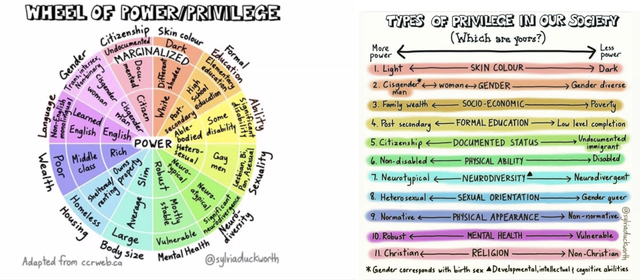Understanding Privilege and Personal Effort: A Balanced Perspective
Recently, I was invited to visiting a nursing home to advice on the home’s marketing strategy. The visit gave me two profound insights. First, the privilege of having cognitive abilities to do things like building a career, and second, meeting a volunteer who had built a fashion business over 10 years, allowing him to volunteer and contribute full-time without financial worries. These experiences underscored the nuanced relationship between privilege and personal effort.
Every week, I’ll be sharing practical tips and invaluable knowledge to guide you on your path to financial independence.
The Concept of Privilege
Privilege refers to unearned advantages that individuals possess due to factors such as race, gender, or socioeconomic status. These advantages significantly influence one’s opportunities and quality of life. For example, someone born into a wealthy family might have access to better education and networking opportunities compared to someone from a lower-income background.
The “Wheel of Power and Privilege” is a useful framework for visualising how different identities intersect to influence power dynamics and access to opportunities. This wheel includes a central ring of dominant identities (e.g., white, male, heterosexual) surrounded by layers representing systemic barriers and marginalized groups. This framework illustrates that privilege is not binary but exists on a spectrum, influenced by various intersecting factors.

Cognitive Privilege
At the nursing home, I realised the immense privilege of cognitive abilities that allow me to do what I do today. Many residents had intellectual disabilities, which significantly limited their opportunities. It pains me to look at residents who were sitting on their beds for several hours staring into space.
Cognitive abilities enable access to education and career opportunities that are often taken for granted. Systemic support for individuals with intellectual disabilities varies, highlighting disparities in opportunities. For example, educational institutions and workplaces often lack the necessary accommodations for people with cognitive disabilities, limiting their ability to succeed. In gaming terms, intellectual disabilities also has a wide AOE (Area of Effect) debuff because it also impacts family members who need to take on caregiving roles.
It is important to recognise the presence of cognitive privilege as it fosters empathy and drives advocacy for more inclusive policies and support systems. This includes advocating for better educational resources, workplace accommodations, and social support networks to ensure that individuals with intellectual disabilities have the opportunities to reach their full potential.
Entrepreneurial Success and Financial Independence
The volunteer I was working with, spent 10 years building a fashion business to the point of financial independence. His journey was made possible not only by his hard work but also by access to resources and networks that others might not have. I can’t say for sure, which of the two played a bigger role.
Building a successful business often involves leveraging initial advantages, such as education, access to capital, and social networks, alongside personal effort and resilience. The volunteer’s ability to network, secure funding, and navigate the business landscape was likely facilitated by certain privileges he had. Through our conversations, I learnt how much grit was needed to build a business in the FMCG industry from scratch along with the late hours he had to put in, together with his founders.
Achieving financial stability allows individuals to contribute to society in meaningful ways. The volunteer’s ability to dedicate time to the nursing home without financial worries exemplifies using success for social good. This highlights the importance of not only achieving personal success but also using that success to make a positive impact on others.
The Balance Between Privilege and Personal Effort
Using the “Wheel of Power and Privilege,” we can see that privilege is not absolute. It’s about recognizing how different aspects of identity confer varying degrees of advantage and disadvantage. For example, while the volunteer had certain privileges, his personal effort in building his business was crucial to his success.
The interplay between privilege and effort shapes individual experiences. For instance, someone might leverage educational privilege to succeed in business, but their hard work and decisions also play a critical role. Understanding this interplay helps in recognizing the importance of both systemic advantages and personal efforts in achieving success.
Privilege exists on a spectrum, and different types of privilege (e.g., financial, social, educational) can vary in degree. For example, while someone might have financial privilege, their social network might not be as strong, or vice versa. Recognizing these nuances helps in understanding the diverse experiences of individuals.
Fostering Inclusivity and Social Responsibility
Supporting policies that help individuals with different challenges is crucial for fostering inclusivity. This includes advocating for better caregiving support for those with intellectual disabilities, accessible entrepreneurial resources, and equitable educational opportunities.
Financially independent individuals can use their resources to advocate for systemic changes and support marginalized communities. Volunteering and philanthropy are powerful ways to contribute positively. For example, funding scholarships for underprivileged students or supporting nonprofits that work towards social equity can have a significant impact.
Like it or not, spending time and effort on a cause will always be harder than just donating money. But we definitely need both.
Engaging with local communities and understanding their needs is essential for creating effective support systems. This involves listening to marginalized voices and incorporating their perspectives into policy-making and community programs.
Providing mentorship and support to individuals from less privileged backgrounds can help bridge the gap created by systemic inequities. Sharing knowledge, resources, and networks can empower others to achieve their goals.
Conclusion
Recognising the nuanced balance between privilege and personal effort helps foster a more inclusive society. Acknowledging one’s privileges doesn’t negate personal achievements but rather situates them within a broader context.
Reflect on your own privileges and consider how you can use them to support others. Advocate for policies that create more equitable opportunities for everyone.
Understanding the interplay between privilege and effort is crucial for creating a more inclusive and equitable society. Use your advantages to foster positive change and support those who face systemic barriers.
By adopting this balanced perspective, we can better appreciate individual achievements while advocating for a more inclusive society. This approach not only acknowledges the importance of personal effort but also recognizes the role of systemic advantages in shaping opportunities and outcomes.

